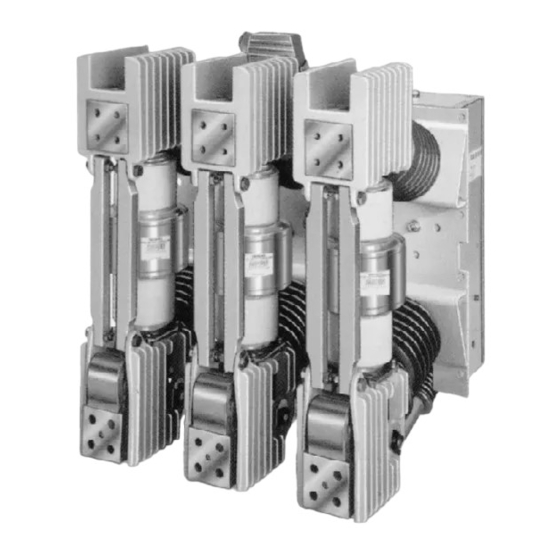Siemens 3AH Installation, Betrieb und Wartung - Seite 20
Blättern Sie online oder laden Sie pdf Installation, Betrieb und Wartung für Industrielle Ausrüstung Siemens 3AH herunter. Siemens 3AH 20 Seiten. Vacuum circuit breaker operator module
Auch für Siemens 3AH: Anleitungen, Installation, Betrieb, Wartung (33 seiten), Anleitung Handbuch (38 seiten)

Vacuum Interrupter/Operator Description
On the undervoltage release 3AX1103, the latch (25) is held
by the locking pin (21) as long as the armature (9) is ener-
gized. If the circuit of the magnet coil (7) is interrupted, the
armature (9) drops off, thus causing the latch (25) to lose its
support and release the striker pin (23).
Following every tripping operation, the striker pin (23) must
be reset to its normal position by loading the spring (31). This
takes place automatically via the operating mechanism of
the circuit breaker.
Since the striker pin of the undervoltage release 3AX1103 is
latched only when the armature is energized, the undervolt-
age release is provided with a screw (29), for locking the
striker pin (23) in the normal position for adjusting purposes
or for carrying out trial operations during circuit breaker ser-
vicing. Position A (locked) disables the undervoltage release.
Position B (unlocked) is the normal operating position.
Figure 12. Latch Details (shown charged).
Capacitor Trip Device
The capacitor trip device is an auxiliary tripping option
(capacitor trip is a system that should be mounted on the
drawout truck) providing a short term means of storing ad-
equate electrical energy to ensure circuit breaker tripping.
This device is applied in circuit breaker installations lack-
ing independent auxiliary control power or station battery.
In such installations, control power is usually derived from
the primary source. In the event of a primary source fault
or disturbance the capacitor trip device will provide short
term tripping energy for circuit breaker opening due to relay
operation.
The capacitor trip converts 120 or 240 VAC control voltage
to a DC full wave voltage which is used to charge a large
capacitor to the peak of the converted wave.
(Figure 14).
Shock Absorber
Circuit breakers are equipped with a hydraulic shock ab-
sorber (61.8) (Figure 6a). The purpose of this shock
absorber is to limit overtravel and rebound of the vacuum
interrupter movable contacts during the conclusion of an
opening operation. The shock absorber action affects only
the end of an opening operation.
Auxiliary Switch (52a/b)
Figure 6a shows the circuit breaker mounted auxiliary
switch (68). This switch provides auxiliary contacts for
control of circuit breaker closing and opening functions.
Contacts are available for use in relaying and external logic
circuits. This switch is driven by linkage (68.1) connected
to the jack shaft (63). The auxiliary switch contains both 'b'
(Normally Closed) and 'a' (Normally Open) contacts. When
the circuit breaker is open, the 'b' contacts are closed and
the 'a' contacts are open.
Spring Charging Motor (88)
Spring charging motors (50.4) (Figure 6a) are available for
both AC and DC operation. If operated with AC voltage, a
rectifier is installed in the circuit breaker.
Figure 13 Undervoltage Locked/Unlocked Selection.
Figure 14. Capacitor Trip Device
18
